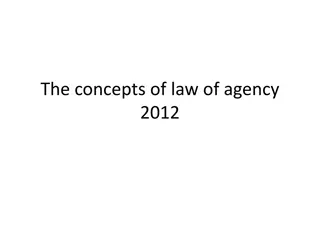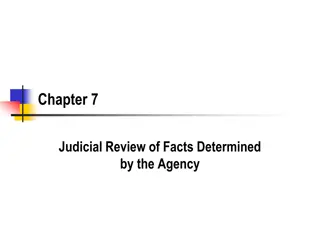Understanding the Law of Agency in Business
The Law of Agency governs relationships involving principals, agents, and third parties. It highlights essential features for a valid agency, emphasizing the agreement between parties, representative capacity of the agent, and the competence of the principal. Learn about the Latin maxim "Qui Facit Per Alium Facit Per Se" and exceptions to the common law position regarding agency relationships.
Download Presentation

Please find below an Image/Link to download the presentation.
The content on the website is provided AS IS for your information and personal use only. It may not be sold, licensed, or shared on other websites without obtaining consent from the author. Download presentation by click this link. If you encounter any issues during the download, it is possible that the publisher has removed the file from their server.
E N D
Presentation Transcript
AGENCY BY MRS C M SIMBOTWE
LAW OF AGENCY The common law position is that he who can act for himself may also act through an agent and this is summed up in the Latin maxim QUI FACIT PER ALIUM FACIT PER SE. However, there are two exceptions to this position: 1. Where personal performance is required; and 2. Where the parties involved expressly or by necessary implication prohibit delegation.
Definition of Agency An agency relationship involves three very specific parties namely: (i) Principal (ii) Agent (iii) Third Party The Principal is the person on whose behalf the contract is made. It is a person on whose behalf the agent acts. The Third Party is the party with whom the agent contracts on behalf of the principal and who as a result of the very special rules enjoys a series of mutual rights and obligations with the principal, but there is no contractual relationship with the agent.
Definition of Agency In law the word agent is used to refer to a person who has legal authority to bind another by entering into contract with a third person on that other s behalf. An agent is a person employed to do any act for another, or to represent another in dealing with third parties or persons. The important feature of the relationship is that the agent has power to bind his principal to a contractual relationship with a third party without the agent himself becoming a party to the contract.
Essential and Legal Rules for a Valid Agency The essential features for a valid agency are as follows: (1) There should be an agreement between the principal and the agent. According to this element, the agency must be created by an agreement between the principal and agent. Therefore there must be an agreement by which a person is appointed as an agent by the other. The agreement may be express (that is, by words of mouth or in writing), or implied (that is, it may arise by the conduct of the circumstances of the cases). parties, by necessity or
(2) The agent must act in the representative capacity. The agent must represent his principal and act on his behalf. Moreover, the agent must have the power to create legal relationship of his principal with third parties. Therefore, the true nature of the relationship should be seen. If the agent acts in representative capacity and had the power to bind his principal with third parties, the relationship is that of agency .
3) The principal must be competent to contract. The principal must be competent or have capacity to enter into a valid contract, that is, he must of sound mind, and have attained the age of majority. Therefore, a minor or a person of unsound mind (insane) cannot appoint an agent to act on his behalf. An appointment of an agent, made by an incompetent person is void.
(4) The agent need not be competent to contract or have capacity to contract. As a general rule there is no requirement that an agent must have full contractual capacity when he acts on behalf of the principal. This is because the contract is that of the principal, and not the agent. The principal must, however, have contractual capacity at the time the contract in question is entered into.
It is therefore legally possible for a minor to act on behalf of an adult principal in bringing about a binding contractual relationship with a third party who has contractual capacity. However, the agency contract between the principal and agent will not be binding on the agent because of the agent s minority. For the same reasons the law denies minors from entering into contractual relations of any kind, minors are generally not engaged as agents for persons with full contractual relations.
Classification of Agents 1. GENERAL AGENTS- appointed to perform some task in a general area. He has authority to enter into any contract on behalf of his principal are normally within the scope of the trade, business or profession in which the agent is employed. 2. UNIVERSAL AGENTS- has unlimited authority to enter into any contract for which his principal has contractual capacity. 3. SPECIAL AGENTS- engaged to undertake or perform a particular task or special function only.
Creation of Agency The relationship of PRINCIPAL and AGENT may be created in any of the following ways: 1. By EXPRESS agreement. 2. By IMPLIED agreement. 3. By Operation of the LAW, that is,.. a. Agency of Necessity b. Agency by Ratification c. Agency by Estoppel d. Agency Under Statutory Provisions
(1) Agency by Express Agreement An agency may be created by express agreement. In this case, an agent is appointed by an agreement in writing or by words of mouth. It may, however, be noted that no particular form or set of words is required for the appointment of an agent.
(2) Agency by Implied Agreement An agency may also be created by an implied agreement. In this case, a person becomes an agent of the other due to the conduct of the parties or the course of dealing between the parties or the situation of the particular case, for example, when one person places another in such a situation in which the other person is understood to represent or act on his behalf, he becomes an implied agent.
In Hely-Hutchinson v. Brayhead Ltd [1967] 3 All ER 98: The directors of a company allowed the chairman to act as though he was in fact the Managing Director, although he had never been appointed to that role and so had no express authority to bind the company. The company was held to be bound by transactions entered into by the Chairman as a result. Similarly, in Mullens v. Miller (1882) 2 Ch D 194: An estate agent was held to have implied authority to give details and make warranties in respect of properties that he was selling. See also Watteau v. Fenwick (1893) 1 QB 346
(3) Agency by Operation of Law In certain instances agency will arise without the parties expressly stating that such a relationship has come into existence between them or indeed that they desire such a relationship be created. The following are the circumstances under which the an agency relationship will be deemed to have come into existence by operation of the law: (a) Agency of necessity (b) Agency by Cohabitation (c ) Agency under Statutory Provisions
(a) Agency of Necessity The law recognizes that in certain situations emergencies arise which may necessitate a person to act promptly in order to protect the interests of another by doing acts which that other person may have done if he were himself present. In such circumstances, the law implies authority on the part of a person to bind another by any act honestly done on his behalf under the pressure of a real commercial necessity even if the person acting in fact acts without the authority or consent of the person on whose behalf he acts. Agency is said to arise in such situations by implication of the law. The agency that so arises is known as agency of necessity.
A typical example of a situation when an agency of necessity will arise is where a carrier of perishable goods suffers a breakdown and engages another transporter to carry the goods to their destination or sells them off quickly at the nearest available market to avoid the loss of the consignment. However, to constitute a valid agency of necessity the following conditions must be satisfied:
(i) There must be a genuine or real commercial emergency Agency of necessity will only arise where there is an emergency. Where the circumstances are such as not to imply an emergency, the law will not recognize the person acting on behalf of another as being an agent of necessity. In Great Northern Railway v. Swarfield (1874) LR 9: The Defendant consigned a horse with the Plaintiff, the Great Northern Railway. When the horse reached the destination, nobody came to take its delivery.
The Plaintiff had no arrangement of its own to keep the animals. Therefore, it delivered the horse to a stable- keeper for its maintenance and safe custody. It was held that the Plaintiff was an agent of necessity, and was entitled to recover charges of the stable-keeper. Similarly, in Sims & Co. v. Midland Railway Company (1913) 1 KB 103: The defendant consigned certain quantity of butter with the plaintiff, Midland Railway Company. Due to the strike, the butter was delayed in transit. The plaintiff sold the butter as it was of perishable nature.
It was held that the sale was binding on the owner the Defendant , and that the plaintiff was an agent of necessity. However, in Prager v. Blastpiel, Stamp and Heacock Ltd (1924) 1 KB 566: there was no necessity and that the sellers had not acted bona fide, and were not therefore agents of necessity to resell the goods. It was held that
Couturier v. Hastie (1856) 5 HLC 673, a cargo of corn was in transit being shipped from the Mediterranean to England. The owner of the cargo sold the corn to a buyer in London. The cargo had however, perished and been disposed of before the contract was made. The seller sought to enforce payment for the goods on the grounds that the purchaser had attained title to the goods and therefore bore the risk of the goods being damaged, lost The court held that the contract was void because the subject matter of the contract did not exist at the time the contract was made. or stolen.
(ii) It must have been impracticable to obtain instructions from the principal or the agent must not be in a position to communicate with the principal or to obtain instructions. It must be shown that the person who acted on behalf of another could not obtain that other s instructions before acting because it was impracticable to or commercially impossible to obtain instructions. This requirement is however, getting more and more watered down with communication. the improvements in
Whereas communication would have been the telex machine where no phone facilities existed, the world has in recent years witnessed phenomenon increase in modes of communication such as fax machine, cell phone, the internet, etc, which have made communication easier and fast. This in turn makes the satisfaction of this requirement in proving agency of necessity less easy. before, the quickest means of
In Springer v. Great Western Railway (1921) 1 KB 257; 24 LT 79: The plaintiff instructed the defendant railway company to transport tomatoes from the Channel Island to London, by ship to Weymouth and by train to London. Owing to bad weather, the ship was detained at Channel Island for three days. When the ship finally arrived at Weymouth, the railway company s employees were on strike, and so offloading was delayed for two days. Worried that the tomatoes would go bad, the railway company sold the tomatoes off locally without communicating, as they could have done, with the plaintiff. The plaintiff then brought the action claiming damages for breach of the contract of carriage. The defendant sought to justify their action of selling the tomatoes under the agency of necessity.
It was held that for there to be an agency of necessity, it must impossible for the agent to obtain the owner s instructions as to what should be done. In the circumstances of this case the defendant should have communicated with the plaintiff when the ship arrived at Weymouth, in order to get the plaintiff s instructions. There was no agency of necessity in this case since communication was not impossible. See also The Choko Star (1990) 1 Lloyd s Rep. 516 have been practically
(iii) The act must be done with the principals best interest in mind. The law does not encourage people to employ themselves all in the name of agency of necessity and thereby impose liabilities on other persons behind their backs. Therefore, it is a requirement that the agent must have acted bona fide in the principal s interests rather than the agent s own interests, and must have acted reasonably in the circumstances. The best interests of the principal will however not override the express instructions given.
In Fray v. Voules (1859) 120 ER 1125: An attorney was engaged to conduct a case on behalf of his client . He reached a compromise on the advice of counsel. The compromise was contrary to the express instructions given by the client. It was held that an attorney has no authority to enter into a compromise against the directions of the instructing client even if he is acting bona fide in the interests of his client. See also Sachs v. Miklos (1948) 2 KB 23; Munro v. Willmont (1949) 1 KB 295
(b) Agency by Cohabitation A wife who lives or cohabits with her husband is regarded has having authority of her husband to buy articles of household necessity. This means that the wife is considered an implied agent of the husband for the purpose of buying household necessaries on credit, and the husband becomes bound to pay for the same. In Debenham v. Mellon (1880) 6 AC 24: A man and his wife were manager and manageress respectively of the hotel in which they cohabited. The husband gave his wife an allowance for clothes but expressly forbade her from purchasing goods on his behalf as an agent. The wife ordinarily purchased clothes from the plaintiff in her own name.
On one occasion, however, she purchased clothes and pledged her husband s credit. It was held that there was no agency in this case as the husband had expressly forbidden it. No agency could be implied from cohabitation either as the couple was not cohabiting in a domestic situation. As the plaintiff well knew, the couple lived in a hotel as manager and manageress, not as a family. The husband was not consequently liable for the debt incurred. The presumption of cohabitation is rebuttable by the husband showing that his wife is adequately supplied with necessaries or that the goods supplied are not necessaries. See Phillipson v. Hayter (1870) LR 6 CP 38
c ) Agency under Statutory Provisions Provisions of certain Acts of Parliament provide for the existence of an agency relationship between parties. (i) Partnership Act, 1890 section 5, provides that every partner is an agent of the firm and his partners for purposes of the business of partnership; (ii) The Income Tax Act section 84 provides that any person or partnership may Commissioner General to be an agent for the payment of tax due by another person or partnership. (iii) Bank of Zambia Act section 48 provides that the Bank (BOZ) shall act as agent for the Government for such purposes and on such terms and conditions as the Minister may determine. be declared by the
(4) Agency by Estoppel An agency relationship may arise by operation of the doctrine of estoppel where a person holds out another as having authority to represent him. The term estoppel may be defined as prevention of a claim or assertion by law. In other words, when someone makes another person to believe that a particular thing or fact is true, then later on he cannot be allowed to deny the truth of that thing. Therefore, when a person, by his conduct or statement, willfully leads another person to believe that a certain person is an agent, then he is estopped or prevented from denying the truth of the agency.
(5) Ratification The term ratification may be defined as the confirmation of the acts already done. Ratification occurs where the agent does an act on behalf of his principal without the principal s prior authority and the principal subsequently adopts the act done. Ratification need not be expressly done; it may be inferred from an act showing an intention to adopt the act performed on behalf of another without that other s prior authority. The acts of a person not appointed agent by another may bind that other if he does an act that amounts to ratification of those acts. See Waithman v. Wakefield (1807) 170 ER 898
There are a number of conditions that must be satisfied for there to be a valid ratification: (i) The principal must be in existence at the time the act was done. See Kelner v. Baxter (1866) LR 2 CP 174; Newborne v. Sensolid Ltd (1953) 1 QB 45 (ii) The principal must be ascertainable or known. See Watson v. Swann (1862) 11 CB (NS) 756; Keighley, Maxted & Co. v. Durant (1901) AC 240
(iii) The principal must have had capacity to contract at the time of the act. See Grover v. Grover Ltd v. Matthews (1910) 2 KB 401 (iv) The act must be ratifiable. See Williams v. Moor (1843) 11 M & W 256; Brook v. Hook (1871) LR 6 Exch 89; Ashbury Railway carriage & Iron Co. v. Richie (1875) LR 7HL 653 (v) The ratification must be made within a reasonable time. See Grover v. Grover Ltd v. Matthews (1910) 2 KB 401 (vi) The acts to be ratified should be valid and lawful
AUTHORITY OF AN AGENT 1. ACTUAL AUTHORITY- conferred on the agent by the principal under the terms of the agreement or contract between them. If the Principal has given prior consent to the agent before acting on his behalf then the agent is said to have actual authority (Freeman and Lockyer v Buckhurst Park Properties (Mangal) Ltd 2 QB 480). APPARENT OR OSTENSIBLE AUTHORITY- legal relationship between the principal and the third party created by representation, made by the principal to the third party, intended to be and in fact acted upon by the third party, that the agent has authority to enter on behalf of the principal into a contract of a kind within the scope of their apparent authority, so as to render the principal liable to perform any obligations imposed upon him by such contract (Freeman case above). 2.
USUAL AUTHORITY the principal is liable for all acts of the agent which are within the authority usually confided to an agent of that character, notwithstanding limitations, as between the principal and the agent put upon that authority (Watteau v Watteau [1893] 1 QB 346)
AGENTS RELATIONSHIP WITH THIRD PARTIES: GENERAL The general rule is that where an agent makes a contract on behalf of his principal, the contract is between the principal and the third party and only the principal can sue on that contract. The agent acquires no rights under the contract, nor does he incur any obligation. He drops out of the picture having performed the task asked of him by his principal.
DISCLOSED AND UNDISCLOSED AGENCY The rights and liabilities of the principal and agent against third parties may differ according to whether the agency is disclosed or undisclosed. Agency is disclosed where the agent reveals that he is acting as an agent if the agency is disclosed it is of no legal significance that the principal is named. The distinction between disclosed and undisclosed agent is important as it affects the principal s ability to ratify the agent s actions. Furthermore, the agent s liability to third parties may depend on whether the agency was disclosed or not.
DISCLOSED AGENCY Where an agent makes a contract disclosing the agency, the normal rule is that a direct contractual relationship is created between the principal and the third party and either party can sue the other on the contract. If an agent acts without the principal s actual authority, the principal can ratify the agent s actions provided that the agent purported to act on the principal s behalf. Only a disclosed principal can ratify an unauthorized contract (Keighley, Maxted and Co v Durant (1901) AC 240)
UNDISCLOSED AGENCY AND THE THIRD PARTY S RIGHT OF ELECTION If the agent contracts with a third party without disclosing that he is acting as an agent, the agency is undisclosed. The contract is initially between the agent and the third party and each may enforce the contract against the other. However, if the third party discovers the principal s existence, he may enforce the contract either against the agent or the principal BUT NOT both (RIGHT OF ELECTION- Boyter v Thomson (1995) 3 All ER 135). The agent still remains liable even when the third party discovers the existence of an undisclosed principal. Moreover, provided that the agent acted with his authority, the principal can intervene and enforce the contract against the third party.
Duties of an Agent (i) Duty to obey or follow instructions of the principal. See Ireland v. Livingstone (1872) 27 LT 79 (ii) Duty to show proper skill and care. See Keppel v. Wheeler (1927) 136 LT 203; Armstrong v. Jackson (1916 -17) ER 1117 (iii) Duty not to make secret profits from agency. See Anderson v. Ramsay & Co. (1903) 2 KB 635 (iv) Duty not to delegate. Delegatus non potest delegare See De Bussche v. Alt (1878) LT 370; Calico Printers v. Barclays Bank (1931) 145 LT 51 (v) Duty not to disclose confidential information. Lamb v. Evans (1893) 68 LT 131
Rights of an Agent (i)Right to receive remuneration. See Way v. Latilla (1937) 3 All ER 759 (ii)Right to be Indemnified (iii) Right to set-off (iv) Right of Lien.
TERMINATION OF AGENCY 1. Notice 2. Completion of Assignment 3. Mutual Agreement 4. Lunacy, Death or Bankruptcy 5. Illegality 6. Dissolution (where principal and/or agent are corporations) 7. Destruction of Subject-matter 8. Expiration of Time/ Elapse of Time























